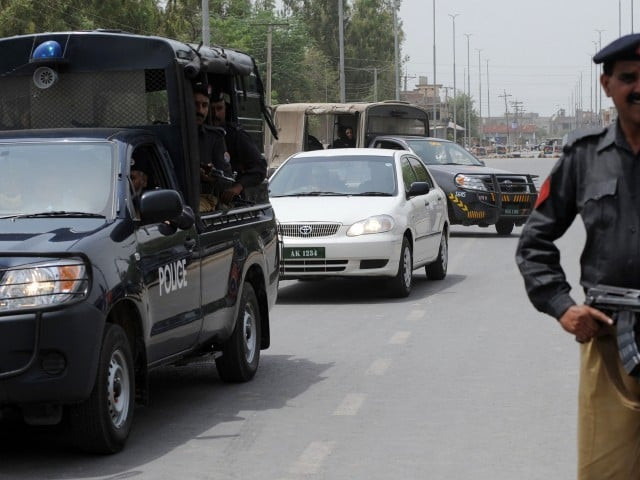Sindh govt plans to do away with plastic nuisance
Cabinet bans polythene bags, approves bulletproof vehicles for top officials

Sindh cabinet approves provision of bullet-proof vehicles to top officials . PHOTO: AFP/FILE
"The ban may cause loss to traders, but nothing is above a healthy environment," said Chief Minister Murad Ali Shah while chairing the meeting at the Sindh Secretariat.
"We are starting the ban from Sukkur and later will expand it to other districts," Adviser to the CM on Information Barrister Murtaza Wahab said while speaking to the media.
Provincial ministers, advisers and special assistants, Chief Secretary Mumtaz Shah, Inspector-General of Police Dr Kaleem Imam and concerned provincial secretaries, were among those who attended the meeting.
The cabinet was informed that a regular plastic bag takes 400 to 1,000 years to degrade and it is a startling fact that almost every piece of plastic ever made still exists in the environment. The amount of plastic waste has been increasing by around 10% each year for the last 20 years.
It was pointed out that use of plastic bags rose to 43 billion in 2005-6 and it further increased to 55 billion in 2007-8. There is a 15% annual growth of the production of plastic bags while the estimated use of plastic bags in the country by 2018-19 would be 140 billion, it was stated.
CM Shah said that his government has promulgated the Sindh Environment Protection (SEP) Act, 2014 and its Section 14(3) reads, "no person shall import, manufacture, stockpile, trade, supply, distribute or sell any scheduled plastic product which is non-degradable and can't be broken down by natural process."
Minister accuses PML-N govt of stealing Sindh’s water
Pre-mature release of prisoners
The cabinet took up the issue of the rights and pre-mature release of terminally-ill prisoners in different jails of the province. On the instruction of the government, the home department had sent a list of 27 terminally-ill prisoners which was forwarded to the health department for constitution of a medical board. The board recommended 12 cases for release, including a condemned prisoner and an Indian national, whose case has been sent to the interior ministry. Another prisoner was released from jail in Hyderabad in July, 2018. Meanwhile, four of the prisoners are under trial and their pre-mature release cases were forwarded to the Cabinet for approval.
The request for pre-mature release was approved on humanitarian grounds. The CM also directed Jails Minister Nasir Shah to send the list of the prisoners who were still languishing in jails for want of surety and also provide him with a list of foreign nationals in jail. "I want to take necessary action on humanitarian grounds," he said.
Vehicles purchase banned
The Sindh Cabinet approved a proposal to authorise the governor, chief minister, speaker, Sindh High Court chief justice, chief secretary, IG and two additional IGs to use armoured vehicles. The ministers or any officers identified to be under threat would be provided an armoured vehicle available in the pool.
The CM was informed that there were 28 vehicles of 1800 CC available in the pool for ministers. Most of the vehicles have already been allotted to ministers. On this, the CM directed the chief secretary to notify a ban on the purchase of new vehicles for ministers, advisers and special assistants for the next three years. The news ministers would use vehicles available in the government pool.
Bill approved
Meanwhile, three bills were approved for introduction in the assembly. They included: the Shaheed Mohtarma Benazir Bhutto Institute of Trauma (SMBBIT), Karachi, Sindh Institute of Cardiovascular Diseases and Sindh Institute of Child Health And Neonatology (SICHN), Karachi.
The cabinet was informed that trauma was increasingly recognised as a global public health epidemic. The World Health Organistation has predicted that trauma would rise from the ninth leading burden of diseases in 1990 to the third leading cause in 2020 worldwide. According to the WHO's 2011 factsheet, over 19% of the world's fatalities on the road occur in low income and middle income countries.
In Sindh, there was no such institute for victims to cope with accidents. Therefore, a trauma centre was established in Karachi. The centre, SMBBIT, is successfully providing services and now under an autonomous status, it will serve as a teaching institute.
Similarly, the SICHN will also establish its satellite centers as has been established by NICVD and serve as teaching hospitals and offer diplomas in different but concerned sectors.
Police rules
Sindh cabinet discussed the draft of the Sindh Police (Posting, Transfer & Tenure) Rules, 2017 and constituted a committee comprising Barrister Wahab, Energy Minister Imtiaz Shaikh and the IG to review the draft and give their recommendations so it could be sent to the Sindh Assembly.
The recruitment rules of the prisons IG and DIG were also discussed. It was pointed out that the caretaker government has made an amendment in Rule 890 for which it was not the competent authority. After discussion, the Cabinet restored the original Rule 890 with a slight amendment. The new rule is, "the inspector-general of prison shall be appointed by promotion from amongst the deputy inspector-general of prison."



















COMMENTS
Comments are moderated and generally will be posted if they are on-topic and not abusive.
For more information, please see our Comments FAQ